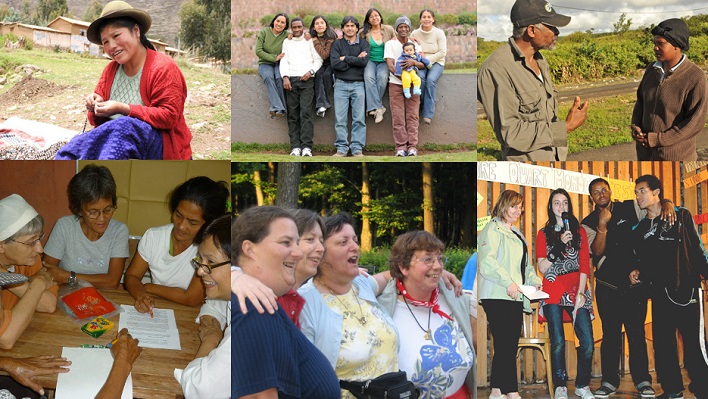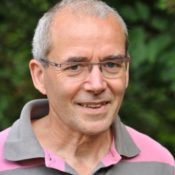We Are a Movement of People | Jean Toussaint

By Jean Toussaint
 In 2015-16, ATD Fourth World conducted an internal review prior to naming the members of the next International Leadership Team. As part of the review, many ATD Fourth World members got together to help take stock of the current situation, and to offer comments from the perspective of their different roles and types of commitment. Here I would like to share some of their reflections with you, as well as some of the things that have struck me the most.
In 2015-16, ATD Fourth World conducted an internal review prior to naming the members of the next International Leadership Team. As part of the review, many ATD Fourth World members got together to help take stock of the current situation, and to offer comments from the perspective of their different roles and types of commitment. Here I would like to share some of their reflections with you, as well as some of the things that have struck me the most.
Some of these reflections revolve around pride: what makes us proud, and what gives us confidence or concerns us about the future. Many people said that they were proud because they saw that our presence and our actions brought results. I found this interesting; but what are the results that people found? What illustrates the value and the competence of ATD Fourth World?
From many examples people gave, I note three: the story of a family who broke out of their isolation; the story of a “really broken” person who found self-worth again; and the story of people who were once themselves dependent on assistance and who went on to become activists for others. These three examples, a bit like evaluations, come from situations that people mentioned as sources of pride resulting from the action of ATD Fourth World.
The first example involves the aspect of belonging, in other words, escaping from isolation, building a network. The second one pertains to the sense of pride in oneself and to a feeling of being capable. I understand “capable” to mean the ability to take back power over one’s own life. The third example is when we move from a situation of dependence, waiting for help, into a situation of responsibility where we are making commitments to others. These examples remind me of Bernadette Cornuau, one of the very first members of ATD in the 1950s, who always told us to evaluate all our actions by asking ourselves this: Have people in poverty gained in freedom and responsibility?
And I think: That’s it — gaining freedom, that’s the ability to take power over your own life. Gaining responsibility comes through becoming an activist for others. Along with these there is another aspect: finding connections and a sense of belonging.
What I also noted is that ATD Fourth World can be useful and effective not only in our presence and actions alongside families in poverty, but also in the ability of our friends and allies to personally commit themselves to changing society in their own domains — for example, at work, in their neighbourhoods, or in their children’s schools. It’s not only people living in poverty who can become stronger and more effective, but also people in every walk of life. The strength of ATD lies in these changes in ability and personal attitudes. All people, whoever they are, gain freedom and responsibility thanks to their connection with ATD Fourth World.
One of the things that makes us proud is not only the results of our actions, but also the more collaborative aspect, such as seeing how we have increased solidarity in a group or a location and seeing how we have learned to work together with both those who are disadvantaged and those who come from far different circumstances. Similarly, we have seen how, in our public speaking, we aim to give voice directly to people living in poverty, and how we can make contributions at high official levels.
Another thing really struck me and also greatly reassured me in the work of this group. Through all their experiences and contributions in ATD Fourth World, people have said that what makes them proud is the continuing search for people in poverty who are as yet unknown to us — the priority for people in the deepest poverty. It is not easy, but this is the message of Fr. Joseph Wresinski, and it is still alive. We have resisted the temptation to remain only with people who have already joined us, who have already taken steps with us. We have resisted this temptation to move forward with stronger people so we can stay rooted in loyalty to the most isolated, to seek out even more isolated people. And this is something we are proud of. I was moved by that because deep down, it is fundamental. The most important thing is not to become bigger or to keep getting stronger, but to remain faithful to the people in the deepest poverty and to Wresinski’s challenge; and this loyalty demands that we be creative. This has really given me confidence in ATD Fourth World.
One more thing about pride: this is the pride of being part of a movement where we try to get to know one another individually. Also, some people raised the issue of salary sharing within the Volunteer Corps; they are proud to consider this a protest against the materialistic rat-race that erodes our societies today.
Confidence and Concerns About the Future
With regard to what gives us confidence and what concerns us, there is obviously a troubling change in the mentality of society — its ever increasing individualism, focus on material possessions, racism, and withdrawal; but in spite of this we are encouraged, because we see more and more people joining us for 17 October. There are never enough of us involved in ATD Fourth World to handle everything, but enthusiasm for 17 October is increasing little by little.
Within ATD Fourth World, what gives us confidence when we look to the future is the quality and human richness of the people with us; the desire to keep going together; and also, for many, the novelty of ATD’s message. Even though it is sixty years old, it is still awe-inspiring when people first discover it. I find that interesting, because it touches not only on what gives us pride, but also on what is important for the future: We are a movement of people, and that gives us confidence for the future.
As we think about the campaign we would like to conduct in 2017 to spread the word about ATD Fourth World and Wresinski, all of these reflections encourage us to propose all kinds of commitments; and we must also raise public awareness that the battle to overcome poverty demands a profound personal and social transformation and not just superficial changes.

